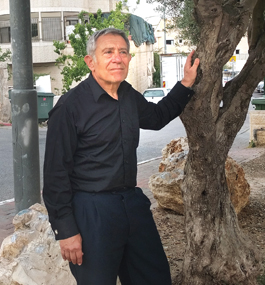Common Ground on a Dividing Line

Josh Mitnick
David Maeir-Epstein '71, standing on Asael Street in Jerusalem.
Twelve years ago, David Maeir-Epstein ’71 and his wife, Alisa, went bargain hunting for a new home in Jerusalem. They found one on Asael Street in the Jewish neighborhood of Abu Tor, priced $100,000 less than comparable homes nearby. Why? Asael Street is on the dividing line between Abu Tor and the Palestinian Arab neighborhood of Al-T’hori. Most Jewish Israelis felt uncomfortable living there.
Asael Street traces the Green Line, the armistice line from the 1948 war that physically divided Israelis and Palestinians for 19 years. Following Israel’s victory in the 1967 Six-Day War and the occupation of the West Bank, Jerusalem was unified under Israeli control. The barbwire-topped wall that once stood between Arab East Jerusalem and Jewish West Jerusalem — between Al-T’hori and Abu Tor — was torn down. But the emotional divide between the two communities remained.
David Maeir-Epstein moved to Israel in 1983; Alisa came with her family when she was 13 years old. David earns his living as CEO of Israelgrants.com, an organization that identifies funding sources for Israeli nonprofits. Six years ago, after he was elected to his local community council, he began thinking about organizing his Jewish and Palestinian neighbors around common concerns and interests.
At the time, Arabs and Jews had little contact with one another. The Maeir-Epsteins were among the handful of Jewish residents who crossed Asael Street and made Palestinian friends. Their children played together. They were invited to one another’s homes. The couple even celebrated the return from the hajj to Mecca with their neighbors.
“There are many coexistence projects in Israel,” Maeir-Epstein says. “Usually, Arabs and Jews get together and share their narratives, their feelings, their history. They break bread together, do some common activity, and then everyone returns to their home. We wanted to create something more concrete, to build on our shared interests in a shared neighborhood.”
And so the Good Neighbors project was born. Like Our Generation Speaks, the effort takes a novel approach to nourishing Israeli-Palestinian connections.
Initially, the Good Neighbors idea sparked resistance on both sides. Some Israelis feared that every Palestinian was a potential terrorist. Some Palestinians feared that any contact with Israelis signified collaboration. Maeir-Epstein and his Palestinian counterparts brought the two sides together to identify concerns they could work together to resolve. Leveraging Maeir-Epstein’s position on the community council, the neighbors got the city to fix broken garbage bins, put in speed bumps, and renovate a nearby soccer field and a pocket park.
This was only the beginning. The new field soon hosted joint Arab-Jewish soccer teams for children. Language classes were organized. Jews from Abu Tor taught Hebrew to the women of Al-T’hori (many of the Palestinian men work in Israel and already have a working grasp of Hebrew). The Jews began to receive lessons in Arabic.
Soon, regular get-togethers called Coffee With the Neighbors brought Palestinians and Jews into one another’s homes. A separate women’s forum was established — the women felt the men dominated the Coffee With the Neighbors conversations and were more interested in politics than interpersonal relations.
Maeir-Epstein is currently trying to raise money to create a marketplace for goods and services that would stretch across the two communities. People in each neighborhood could earn money there; ties would be strengthened at the same time.
The overt signs of change go beyond the garbage bins, the new park benches, and the smattering of Hebrew and Arabic phrases learned. Today, there’s a greater openness to and understanding of those across the divide.
Not long ago, a 10-year-old Al-T’hori boy threw a tennis ball at an Abu Tor woman standing on her balcony. Her first thought was to call the police. She called the Maeir-Epsteins instead. David visited the boy’s parents, who pledged to bring their son to the woman to apologize. A situation that might have seeded distrust and hostility between communities was instead reduced to what it actually was: an innocuous incident common to otherwise good neighbors around the world.
Now the Jerusalem Municipality, the Israel Association of Community Centers and an EU-funded initiative are looking at the Good Neighbors project as a potential model for all “seam” neighborhoods between East and West Jerusalem.
— J.D.
